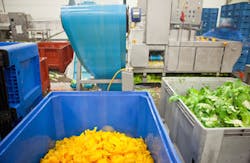Budget cuts will not affect food processing facility inspections, FDA says
The number of inspections at food processing facilities will not be reduced as a result of budget cuts, the Food and Drug Administration (FDA) has said.
Concerns have been raised by the industry that food safety might be compromised if the watchdog cut the number of food inspectors at the end of September.
In an interview for USA Today, FDA spokeswoman Shelly Burgess explained that the FDA aimed to "absorb the cuts" without posing any threat to public health. Officials were working on ways to cut spending through other measures, so that food inspections would not be affected, she said.
The agency is responsible for all food products manufacturing except meat and poultry and the news of potential inspector redundancies sparked fears that unsafe food might reach consumers later this year. Last month it was announced that up to 2,100 FDA inspectors, or 18 percent of the total number, could lose their jobs because of the budget reductions called sequestration.
Moreover, sequestration may have an impact on the implementation of the Food Safety Modernization Act, which is set to be the most comprehensive food-safety law in decades. Budget cuts were seen as a possible hurdle for the timely rollout of the new regulation. In order to ensure that the law would come into effect as scheduled, the FDA is to receive $40 million in funding.
According to Caroline Smith DeWaal, food safety director with the Center for Science in the Public Interest, these estimates were the worst-case scenario and it was highly unlikely that such a reduction would be implemented in practice. The FDA will decrease travel and training, instead of reducing inspections at food production and processing facilities, added Michael Taylor, the agency's deputy commissioner for foods.
RELATED: FDA requests higher budget for 2014
The exact way in which the budget will be distributed across FDA activities is still being worked upon. In terms of the Food Safety Modernization Act, the United States has made progress in 2013 compared to last year but it has lost some ground in terms of food safety, Taylor said.
Meanwhile, representatives of the food manufacturing industry welcomed the FDA's pledge to keep inspections at current levels. According to Louis Finkel of the Grocery Manufacturers Association, the industry was "comforted" that food safety would not suffer from the planned budget cuts. Ensuring the best possible food safety for U.S. consumers is one of the most important tasks of the government and the industry acknowledges the fact that Congress saw this and allocated additional resources to it, he added.
Although the FDA will have to spend more money on hiring inspectors and technicians to make sure it is compliant with the new law, it can feel confident about funding in 2013, despite sequestration, commented Erik Olson, director of food programs at the Pew Charitable Trusts.
It was also announced recently that the Department of Agriculture's Food Safety and Inspection Service, which oversees all meat and poultry production and packing plants, will not be affected by sequestration at all, USA Today reported.
